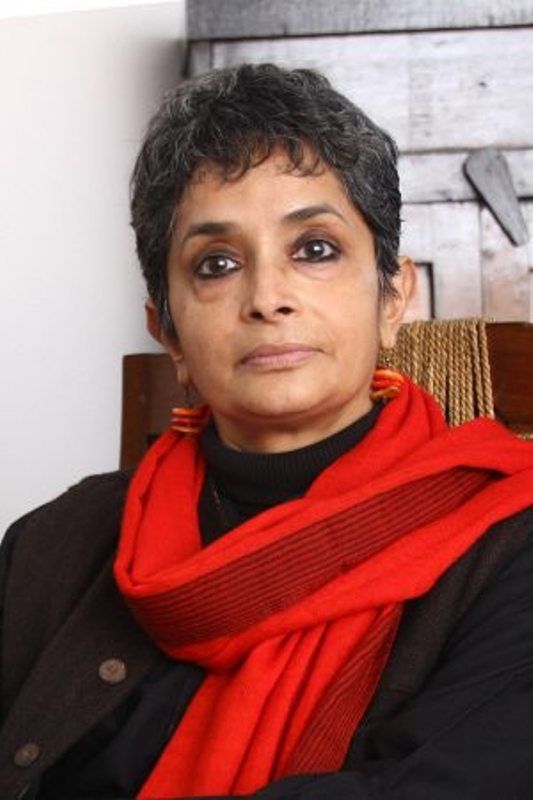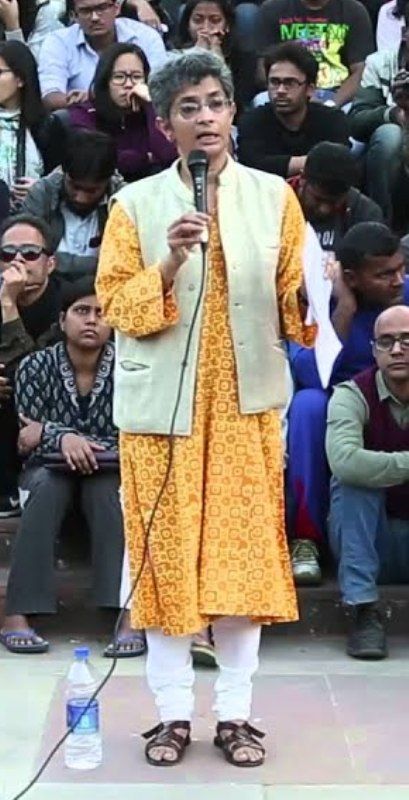Nivedita Menon Age, Husband, Children, Family, Biography & More
Quick Info→
Age: 64 Years
Marital Status: Divorced
Hometown: Mumbai

| Bio/Wiki | |
|---|---|
| Nickname(s) | Nivi [1] |
| Profession(s) | • Writer • Professor |
| Famous For | Raising anti-national slogans during the protests in JNU in March 2016 on Kashmir conflict |
| Physical Stats & More | |
| Eye Colour | Black |
| Hair Colour | Salt and Pepper |
| Career | |
| Award | In 1994, Nivedita won the A. K. Ramanujan Award for translation from Hindi and Malayalam into English. |
| Personal Life | |
| Date of Birth | Year, 1958 |
| Age (as of 2022) | 64 Years |
| Birthplace | Mumbai |
| Nationality | Indian |
| College/University | Lady Shri Ram College, Delhi |
| Educational Qualification(s) | • Bachelor’s degree at Lady Shri Ram College, Delhi [2] • She holds a Ph.D degree. [3] |
| Controversy | On 12 March 2016, Nivedita was accused of making ‘anti-national’ remarks during the lectures on nationalism organized by JNU faculty and students. In her lecture, she questioned Indian state in providing human rights excesses in Jammu and Kashmir and Nagaland. Saurabh Sharma, a leader of the BJP’s student wing and joint secretary of the Jawaharlal Nehru University Students’ Union (JNUSU), filed a complaint against Nivedita at the Vasant Kunj police station in New Delhi. A clip from her lecture was shown on a news channel in which she said, “Hindu Society is the most violent, to the root violent society in the world.”[4] |
| Relationships & More | |
| Marital Status | Divorced |
| Family | |
| Husband/Spouse | Name Not Known (IAS officer) |
| Parents | Mother- Name Not Known
 |
| Siblings | Brother– Dilip Menon (historian at the University of Witwatersrand, South Africa) Sister– Pramada Menon (former co-founder and director at CREA) |

Some Lesser Known Facts About Nivedita Menon
- Nivedita Menon is an Indian writer and professor who is known for raising anti-national slogans during the protests in JNU in March 2016 on the Kashmir conflict.
- In 2009, she started teaching at the International Studies School of Jawaharlal Nehru University (JNU) in Delhi. Before she started working at Jawaharlal Nehru University, she used to teach at the Political Science Department of Delhi University for seven years and Lady Shri Ram College for 15 years.
- In the 1980s, when there were protests against beauty contests in Delhi University, she replaced it with a Freshers’ Talent Contest in university.
- In an interview, she talked about how she learned about issues of sexuality and politics. She said that she was influenced by the work of global feminists like Betty Friednan, Germaine Greer and Gloria Steinem.
- She has written and edited many books about feminism and politics, including Recovering Subversion: Feminist Politics Beyond the Law (2004).
- In 2012, when there were protests against Delhi gang rape, she released a book titled ‘Seeing Like a Feminist’ that gained a lot of popularity.
- On 18 October 2016, she wrote an article in a newspaper in which she criticized the Uniform civil code (UCC). In the article, she wrote,The talk of a Uniform Civil Code has nothing to do with gender justice. It has entirely to do with a Hindu nationalist agenda to ‘discipline’ Muslims.”
- In 2022, a movie titled ‘The Kashmir Files’ was released. In the film, actress Pallavi Joshi portrayed the role of Nivedita Menon, but the name of her character was Radhika Menon in the film, a JNU professor who provokes her student to fight for ‘Kashmir’s freedom.’
- She has written various articles on feminism and gender equality. Some of them include ‘Is Feminism about Women?,’ ‘Anti-Corruption Movement and the Left,’ ‘The Postnational Condition,’ and ‘Radical Resistance and Political Violence Today.’
- In an interview, she talked about why people blame girls’ dresses for getting raped. She said,The notion of choice is not enough to answer this because such freedom of choice is always exercised within strict boundaries that are non-negotiable — class, race, caste and gender-based. Women do make choices but not in circumstances of their own making. And often, women choose options that go against normative feminist values. Here, we see the contradiction between two core beliefs of feminism — the belief in the autonomy of women versus the hegemony of dominant values that constrain the freedom to choose.”





